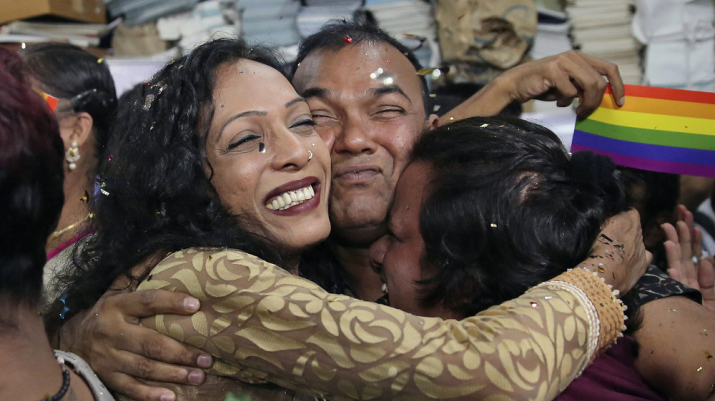FEATURES|THEMES|Commentary
Buddhistdoor View: Let Water Flow Naturally—Cultivating Acceptance and Reducing Prejudice
 From thriveglobal.com
From thriveglobal.comLast week, India’s Supreme Court decriminalized gay and lesbian relationships. The court ruled that section 377, a colonial-era law that forbade certain forms of sexual intercourse that disproportionately applied to gay and lesbian relationships, was not within the constitution’s purview. “Criminalizing carnal intercourse is irrational, arbitrary, and manifestly unconstitutional,” said outgoing chief justice Dipak Misra. (BBC News) Activists across India celebrated the move, hailing it as a potential step toward further legislative and cultural milestones that would help Indian society grow more accepting and less prejudiced.
We should distinguish between the inner cultivation of a broader attitude of non-judgment and acceptance, and political and social projects that seek to enforce an egalitarian vision of society. What is considered “acceptable” or “mainstream” and what is “taboo” or “off-limits” varies according to social context. There are even different contexts co-existing in the same region, culture, or time period. For example, the Indian law in question was a colonial-era law. Anti-gay laws never existed in what was before then a complex confederation of dominions held together by the Mughal empire (this is not to say that the Mughals were pro-gay marriage). However, since the 1960s, British society has become far more liberal, and in 2013 the Cameron-Clegg coalition government legalized same-sex marriage and posthumously pardoned codebreaker and computing pioneer Alan Turing (1912-54). Five years later, India would demonstrate that also in India there is a (cultural) appetite for such a legislative pushback against the more socially conservative strains of the BJP’s Hindutva ideology.
It is not clear whether it is shifting societal attitudes that influence legislation, or whether it is an act of legislation that starts to move mindsets toward a more progressive direction. While the courts indeed provide a check against the bigoted impulses of the majority, it is education in the attitudes of tolerance and open-mindedness can help shape societal attitudes toward minorities in a positive direction. Enlightenment-influenced ideals of natural rights, which have also inspired progressive visions of religion such as engaged Buddhism or liberation theology, come into conflict with traditionalist or conservative notions of natural law, which according to influential conservative thinkers such as Edmund Burke (1729–97), have resulted from a transmission between past generations and the present (and as such should be preserved rather than uprooted).
Very often natural law has theological presuppositions, and this is perhaps similar to the cultural dominance of caste (which is commonly associated with Hindu thought but dates back to the millennia-old Manusmriti) in contemporary India. For better or for worse, caste has proven its longevity as a system that has shaped the social order of Indian civilization for a thousand years. The fact that today it is constitutionally illegal to discriminate on the basis of caste, and yet so much of Indian society continues to revolve around its regulating functions and biases, is indicative that proponents of legislating equality and those of natural law must ideally accommodate and compromise with each other should there be any change in the status quo.
 Reactions to the ruling of India's Supreme Court. From chicagotribune.com
Reactions to the ruling of India's Supreme Court. From chicagotribune.comDiscriminatory laws are often implemented in the name of maintaining the “natural” way of things: in India, section 377’s goal was always to punish “carnal intercourse against the order of nature with any man, woman, or animal.” (BBC News) And in the US, Republicans and conservative Christian politicians and lawmakers are attempting to roll back abortion laws and legislation on gay marriage, which is seen as unnatural.
Buddhism has within its philosophy, particularly through the principle of no-self (anatta), all the ingredients for a radical critique and deconstruction of bigotry and presumptions about the “natural state” of the human person. It also lacks the theological motivation for certain kinds of discrimination. However, it has always adjusted itself to the social norms and laws of whatever society it has diffused into. And all societies have their prejudices, some of them shaped by culture, philosophy and religion, or legal traditions. Then, what is natural? If an open mind that can accept different modes of being is what we aim for as compassionate and wise, are we deviating from what is natural, or are we aligning ourselves with the freest and most open (natural) way of being?
Perhaps “naturalness” should be distinguished from the social-cultural-political enforcement of “normativity,” which encompasses sexuality and even gender roles. Naturalness is open, embracing, and understanding. In a Daoist sense, it seeks to neither pursue righteousness nor avoid unrighteousness, because to do either is to fall into the trap of the righteous-unrighteous or good-bad dichotomy. However, normativity is something quite different, requiring active ideological, sociological, political, and cultural enforcement through the media, government laws, and religious and civic bodies.
In the context of the historical prejudice against homosexuality, Daoist philosophy would perhaps see society’s fixation with enforcing heteronormativity as a disservice to the complex phenomenon of human sexuality. Like allowing water to flow its natural course, why not let people simply love? By that, one means the act of loving, caring, and doing the things that would be associated with love in a mutually consenting adult relationship.
Might the urge to enforce righteousness itself plant the seeds of prejudice? How do we strike a balance between understanding cultural contexts and staying true to opening our minds? Past inequalities and prejudices need a fair-minded state to be corrected. The individual’s inner openness, however, can only come through inner cultivation of tolerance and acceptance, through being mindful of our biases and prejudices and examining how and why we see things as good or bad. It is perhaps by applying Buddhism’s deconstructionist heritage, along with some help from Daoist ideas of aligning with the natural flow of the universe’s cosmic energies, that we can reach a truly natural personal state of openness.
See more
India's top court legalises gay sex in landmark ruling (BBC News)
Related features from Buddhisdoor Global
Gay Marriage and Buddhism: A Simple Deal
The Active Buddhist: George Takei
Change from Within: Creating a World of Hope, Love, Compassion, Empathy, and Forgiveness
Difficult Conversations: Mushim Patricia Ikeda
Related news from Buddhistdoor Global
Buddhists Lend Support as Thousands Celebrate LGBT Rights in Seoul
Buddhist Temple in Tokyo Offers Graves for LGBT Couples
US Buddhists Call for a United Stand Against Injustice and Suffering














